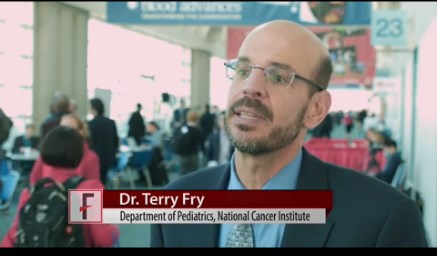User login
SAN DIEGO – In a first-in-humans trial, chimeric antigen receptor (CAR) T-cell therapy directed against CD22 was shown to be safe and was associated with minimal residual disease (MRD)–negative complete remissions in 8 of 10 children and young adults with relapsed/refractory B-precursor acute lymphoblastic leukemia treated at the highest dose levels. One patient remains in remission more than 1 year of treatment, one had a 6-month remission, and one had a remission lasting 3 months.
In a video interview, co-principal investigator Terry J. Fry, MD, of the Center for Cancer Research at the National Cancer Institute in Bethesda, Md., discusses the rationale behind using an alternative antigen target in salvage therapy for ALL, and the potential for combining antigen targets to treat patients with relapsed/refractory ALL.
The video associated with this article is no longer available on this site. Please view all of our videos on the MDedge YouTube channel
SAN DIEGO – In a first-in-humans trial, chimeric antigen receptor (CAR) T-cell therapy directed against CD22 was shown to be safe and was associated with minimal residual disease (MRD)–negative complete remissions in 8 of 10 children and young adults with relapsed/refractory B-precursor acute lymphoblastic leukemia treated at the highest dose levels. One patient remains in remission more than 1 year of treatment, one had a 6-month remission, and one had a remission lasting 3 months.
In a video interview, co-principal investigator Terry J. Fry, MD, of the Center for Cancer Research at the National Cancer Institute in Bethesda, Md., discusses the rationale behind using an alternative antigen target in salvage therapy for ALL, and the potential for combining antigen targets to treat patients with relapsed/refractory ALL.
The video associated with this article is no longer available on this site. Please view all of our videos on the MDedge YouTube channel
SAN DIEGO – In a first-in-humans trial, chimeric antigen receptor (CAR) T-cell therapy directed against CD22 was shown to be safe and was associated with minimal residual disease (MRD)–negative complete remissions in 8 of 10 children and young adults with relapsed/refractory B-precursor acute lymphoblastic leukemia treated at the highest dose levels. One patient remains in remission more than 1 year of treatment, one had a 6-month remission, and one had a remission lasting 3 months.
In a video interview, co-principal investigator Terry J. Fry, MD, of the Center for Cancer Research at the National Cancer Institute in Bethesda, Md., discusses the rationale behind using an alternative antigen target in salvage therapy for ALL, and the potential for combining antigen targets to treat patients with relapsed/refractory ALL.
The video associated with this article is no longer available on this site. Please view all of our videos on the MDedge YouTube channel
AT ASH 2016
